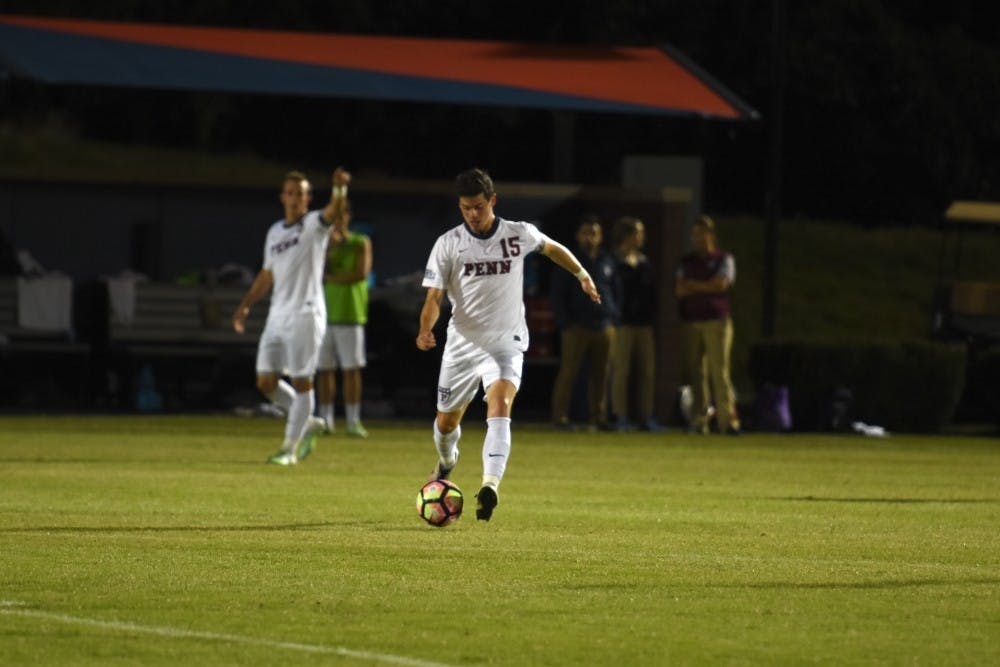
Though he finished his athletic career on the soccer field, senior Matt Poplawski also spent some time on the Palestra floor as a basketball player before changing his path.
Credit: Peter RibeiroMost athletes come into Penn with a plan: to play their respective sport for four years, and to ultimately live that dream of being an Ivy League athlete that they agreed to the day they committed.
However, not all goes as planned. Not every athlete has the same experience, and not every athlete gets to live the perfect four-year experience that they once had in their head when they agreed to play at Penn. But while some may quit and leave athletics behind altogether, other athletes can’t let go of their passion for the grind and that constant drive to improve for something bigger than themselves.
Speaking from personal experience having gone from field hockey to rowing, the switch is among the hardest things I have done both physically and mentally, and has boosted my drive to succeed to become a part of something I had never planned to even be a part of.
Similarly, other such athletes exist like Lexi Slotkoff, who was initially recruited to Penn volleyball but is now a powerhouse on women's rowing. Matt Poplawski, who was recruited for soccer and also briefly became a part of the men's basketball team, now just plays soccer for Penn.
For Slotkoff, her decision to join rowing was not dependent on her decision to stop playing volleyball.
“The two are separate in my mind. Leaving volleyball was about removing myself from a situation that was creating unhappiness, and that decision was solidified by my third broken foot,” Slotkoff said. “Joining rowing was in independent decision. I had always been interested in it since a lot of my friends in high school and college rowed.”
On the other hand, Poplawski, who picked up basketball after committing to Penn for soccer with approval from soccer coach Rudy Fuller, eventually dropped one for the other.
“My circumstance was a little different for leaving basketball. It actually wasn’t my choice to stop playing," Poplawski said. "When Steve Donahue was hired he made changes to the roster and I was let go."
While decisions like this can be hard after dedicating so much of one's life to a respective sport, it can teach athletes a lot about who they are when adversity strikes.
The process of switching can be tough on the mind and body of an athlete, but it is how they handle the situation that defines how they will attack the next sport of their choosing.
“I was at a low point when I quit volleyball because I always defined myself as an athlete, but I ended up proving to myself the opposite as I joined one of the most intense and physically gueling sports. [Rowing] has become my passion and defined by Penn experience,” Slotkoff said. “I learned if you want something bad enough, you can be successful regardless of your experience.”
“Through the process of leaving the basketball team I rededicated myself to the goal of playing professional soccer, and had the best season of my career my senior year," Poplawski added. "I sacrificed a lot by playing both sports, and now I’ve been able to take on more of the full Penn experience."
Undoubtedly, the hardest part of the experience is leaving behind the sport you have dedicated your life to and have ultimately grown to love over the years. However, switching to a different sport can be rewarding and have positive outcomes for athletes who experience it.
“I’ll always miss basketball," Poplawski said. "It was the sport I fell in love with first, but in the end I’ll always be thankful for my Penn Athletics experience."
Similarly for Slotkoff, this experience changed her life and brought her to something she loves and is very successful at.
“Things happen for a reason, and I am so grateful that I got recruited to Penn to play volleyball because without that, I wouldn’t be in the position I am today playing a sport that has become an integral part of my life and identity,” she said.
From one sport to another, these athletes have not only brought more to their new teams, but have also proven to themselves their desire to succeed at whatever they set their mind to.
The Daily Pennsylvanian is an independent, student-run newspaper. Please consider making a donation to support the coverage that shapes the University. Your generosity ensures a future of strong journalism at Penn.
Donate



